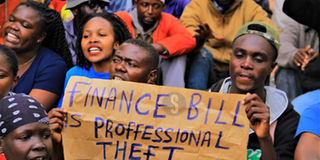Kenya asks public for help with economic fix laws after protests

Members of civil society demonstrate outside the Kenyan parliament over the Finance Bill on June 6, 2024. PHOTO | COURTESY.
What you need to know:
- President William Ruto discarded tax hikes worth more than 346 billion shillings ($2.7 bln) in June after protests that killed more than 50 people.
Nairobi. Kenya's finance ministry will seek suggestions from the public on new legislation to boost revenue and tackle other challenges, Finance Minister John Mbadi said on Monday, after protesters forced the government to withdraw its financing law.
President William Ruto discarded tax hikes worth more than 346 billion shillings ($2.7 bln) in June after protests that killed more than 50 people.
The move left the heavily indebted government with a bigger budget deficit for this financial year, mounting pending bills, and a delay in funding from the International Monetary Fund.
"We are barely managing. This is not where we wanted to be, but we are here," Mbadi told a budget preparation meeting. He was appointed from the opposition last month as Ruto sought to stabilise his government.
The minister initially said he would revive some tax hikes in the abandoned finance bill, before rowing back after a public outcry and threat of more protests.
"I will be issuing a circular tomorrow, inviting the public's participation to submit proposals on some legislative reforms to improve our current economic situation," he said.
Kenyans will have until Sept. 20 to submit views.
Mbadi said the country had no choice but to keep servicing its debt, which stands at above the optimum level recommended by the World Bank and the International Monetary Fund, after years of borrowing driven by infrastructure construction.
"We have no two ways about it. There is no debt restructuring in this country. We will not accept it. We will not do it. We will manage our debts and pay and remain afloat," he said.
Once the situation improves, the government will consider tax cuts in the medium term, Mbadi said, including reducing the value added tax on goods and services to 14 percent from 16 percent, and slashing the corporate income tax by 500 basis points to 25 percent.





